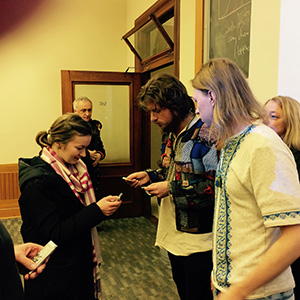 |
|||||||
|
|||||||||||
On February 19th, the Columbia University community had a unique opportunity to talk with two members of the team behind the winner of the 2015 Sundance Film Festival's prestigious World Cinema Jury Prize for a documentary feature - "The Russian Woodpecker." Fedir Aleksandrovych, a theatrical artist and the documentary's main figure, and Artem Ryzhykov, the cinematographer, were present to discuss the film's conception, research, and other behind-the-scenes details. "The Russian Woodpecker" follows Fedir's investigation into the events of the Chornobyl nuclear accident, prompted by chatter on Russian message-boards and social media about the real cause of the disaster being tied up in some shadowy conspiracy. These theories lead the documentary team to discover the existence of the enormous "Duga-3" radar system--nicknamed the "Russian Woodpecker," for the tapping sounds it generated--built by the Soviet Union within 7 kilometers of the Chornobyl reactor. Intriguingly, the existence of the Duga-3, now inside the Chornobyl exclusion zone, is almost completely unheard-of in Ukrainian society, and many people present at the discussion, including Dr. Shevchuk, expressed their surprise at this revelation. Despite standing 150 meters tall and spanning a full kilometer in length, the "Woodpecker," supposedly built as a first-warning system for American missile activity "beyond the horizon," remains largely secret.
During his first visit to the Duga-3 site, Fedir claims that he intuited there was some connection between the giant radar and the Chornobyl tragedy (Artem mentioned that Fedir's another prophetic claim came true: war between Ukraine and Russia). And so the film follows him and others as they research the "Woodpecker," conducting interviews with former Soviet scientists, politicians, and military officials. Ugliness and paranoia begin to creep in, as the team meets resistance and even threats in their pursuit of new insights. Tying the loose threads together, Fedir and the team come to a terrible conclusion: that Chornobyl's meltdown was a calculated and directed move to cover up the mindbogglingly expensive failure of the theoretically-unsound and ultimately useless Duga-3. The audience was understandably skeptical of this new take on an event conventionally understood to be an accident. However, Fedir's claim that the team had traced things back to the very official who ordered the "cover-up" had everyone's interest piqued. In response to our inquiries as to who this mysterious man (or woman) is, Fedir and Artem insisted that, to find out, you have to see the film. During production of "The Russian Woodpecker," the Maidan Revolution exploded in Kyiv, and so the film inevitably gets tied up with these events. As Fedir explained, the overarching theme connecting these two stories is the exposure and defeat of "the Soviet monster," the imperial regime that wasted billions on futile weapons of war, disregarded the value of human life, and crushed Ukrainian society and national pride with oppression. Maidan, in this view, represents a final battle to destroy the soul of the Soviet monster, which survived beyond the apparent collapse of the USSR. It seems certain that many people will treat "The Russian Woodpecker" as the fruit of an insane conspiracy theory, which is probably contributed to by the wild-eyed artistic flair Fedir injects into parts of the film. Still, what I really appreciated about our discussion with Fedir and Artem and disarmed any cynicism one might have is the fact that the film crew wholeheartedly believed in their findings. Moreover, they maintained that they do not seek to force their theory onto anyone. Rather, they hope their film can help to prompt an overdue international investigation of the 28-year old catastrophe, which can put to rest the ghosts of Chornobyl with thoroughness and openness and without bias. I, for one, am very much looking forward to the chance to see "The Russian Woodpecker" in its entirety when it finds an American distributor.
Author: Olya Yarychkivska, Ph.D. candidate, Columbia University; Co-founder, Razom
|
|||||||||||
